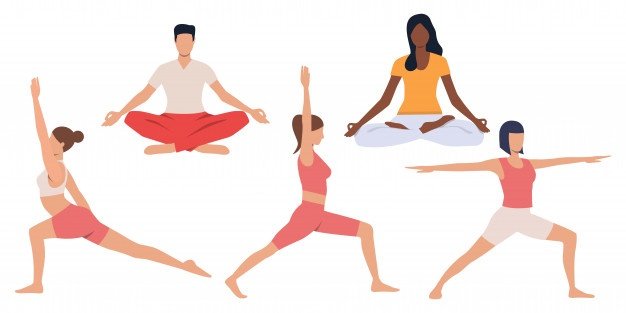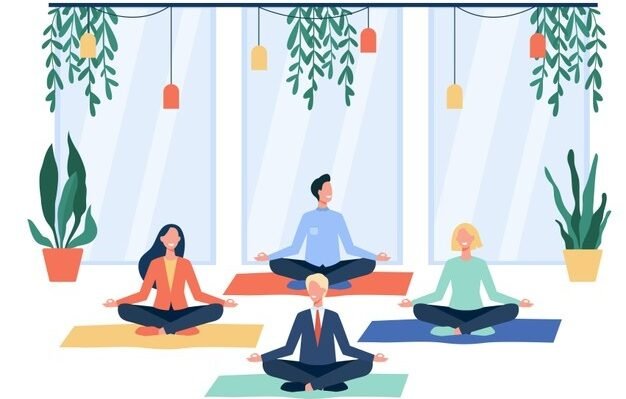How Yoga can Reduce Symptoms of Anxiety: Know 9 Poses
- 0.0.1 30-Second Summary
- 0.0.2 Can Yoga Help Overcome Anxiety?
- 1 9 Yoga Poses For Stress And Anxiety Relief
- 1.1 Bow Pose or Dhanurasana –
- 1.2 Camel Pose or Ustrasana –
- 1.3 Bridge Pose or Setu Bandhasana –
- 1.4 Child Pose or Balasana –
- 1.5 Headstand or Shirsasana –
- 1.6 Box Breathing Pranayama –
- 1.7 Complete Breath Pranayama –
- 1.8 Ocean Breath Pranayama –
- 1.9 Alternate Nostril Breathing –
- 2 Other Yogic Practices That Help Combat Anxiety Disorder
30-Second Summary
-
Depression, stress, and anxiety disorders affect millions.
-
Chronic stress and anxiety are detrimental to your physical and emotional health.
-
People often rely on OTC stress supplements to manage stress and anxiety symptoms.
-
Brillia may be one of the best anxiety supplements for managing anxiety, irritability, restlessness, and inattention.
-
Both kids and adults can take Brillia.
-
Brillia reviews appear quite encouraging to buyers.
-
Along with supplements, people can embrace a yogic lifestyle for alleviating stress and anxiety naturally.
-
Many yoga poses may help reduce the symptoms of stress and anxiety.
-
Meditation, mindfulness, and mindful eating are three pillars of a yogic lifestyle that may help people manage their stress better.
Can Yoga Help Overcome Anxiety?
Stress and anxiety affect millions of people worldwide. The National Institute of Mental Health (NIMH) reveals shocking data[1], informing that over 40 million Americans suffer from an anxiety disorder. According to the shared statistics, 19.1% of adults have had any anxiety disorders recently. 25.1% of children aged 13 and 18 get anxiety disorders.
There are many reasons – sociological, political, financial – for stress and anxiety, and the bad news is chronic stress and anxiety result in serious health disorders. Adapting to a yogic lifestyle may help reduce stress and anxiety disorders significantly.
Note that we said a yogic lifestyle, which is NOT about a few yoga poses but making lifestyle alterations based on ancient yoga philosophy. While the physical postures of yoga, rhythmic breathing, and meditative exercises help you create a holistic mind-body unison, a yogic lifestyle helps you sustain the benefits of yoga.
Regular practice of yoga raises serotonin levels and lowers monoamine oxidase levels. Serotonin, known as the happy hormone, plays a crucial role in stabilizing and boosting mood. Monoamine oxidase degrades the neurotransmitters – norepinephrine, involved in the body’s flight-or-fight response, serotonin, the happy hormone, and dopamine, the feel-good hormone. Inhibition of monoamine oxidase increases the concentration of the neurotransmitters.
9 Yoga Poses For Stress And Anxiety Relief
Living with an anxiety disorder negatively affects the quality of life and physical health. Can a yogic lifestyle help you bypass the extreme stress and anxiety levels that modern life is fraught with? Emerging research indicates so. A yogic lifestyle is based on ethical guidelines outlined in Patanjali’s Ashtanga yoga. Here we share 9 yoga tips that may help you counter burnout, increase self-awareness and self-compassion, and help you with a healthy lifestyle.
If you always feel tense, nervous, and restless, if you find it difficult to concentrate, and if you have a fast heartbeat or are sweating, it might be symptoms of mounting anxiety within you. Under extreme stress and anxiety, the body triggers the release of stress hormones, causing physiological changes. Several studies[2] have confirmed yoga’s positive effects in reducing depression, anxiety, and stress.
The following yoga poses are considered useful in reducing anxiety and tension from the system. However, the poses should be practiced under the supervision of a yoga teacher or expert.
-
Bow Pose or Dhanurasana –
The body takes the shape of a bow, hence the name. Perform this pose after finishing your main meal. This pose engages back and abdominal muscles and strengthens them. It also promotes circulation in the body and helps lower cortisol levels.
-
Camel Pose or Ustrasana –
This pose improves posture, relieves back pain, and stimulates the thyroid, pituitary, adrenal, and pineal glands. Ustrasana also improves energy flow and lowers fatigue.
-
Bridge Pose or Setu Bandhasana –
This pose resembles a bridge, hence the name. It helps stretch the back and leg muscles, chest, neck, and spine. Setu Bandhasana has a calming effect on the brain, reducing anxiousness and enhancing relaxation and sleep.
-
Child Pose or Balasana –
Individuals who have sleep deprivation may try the child pose. This yoga pose helps maintain the spine’s natural alignment and relaxes the back and spine. It also stretches hips, thighs, legs, and ankles and boosts blood circulation.
-
Headstand or Shirsasana –
You turn your body upside down and reverse the blood flow while doing this pose. The pose also requires you to focus on breathing to induce calm. A headstand is recommended for stimulating the pituitary and pineal glands. It also helps decrease stress and depression.
-
Box Breathing Pranayama –
Pranayama focuses on controlling breathing. This form of pranayama involves taking slow deep breaths. Deep breathing has a calming effect on the autonomic nervous system (ANS). Slow breathing stimulates the body’s parasympathetic system and helps with relaxation and calmness. Box breathing can effectively lower stress, boost mood, and improve concentration.
-
Complete Breath Pranayama –
Practicing this form will promote oxygen supply in the body and alleviate stress and anxiety.
-
Ocean Breath Pranayama –
This breathwork involves long, deep, controlled inhalation and exhalation. It boosts oxygen consumption and calms the body’s stress response. If you are under stress, this breathing pattern may help promote relaxation.
-
Alternate Nostril Breathing –
This breathing yoga technique helps with relaxation. A person can get rid of accumulated tension and fatigue by practicing this pattern. It energizes both sides of the brain and helps clear blocked energy channels.
Other Yogic Practices That Help Combat Anxiety Disorder
-
Practice mindful eating
Many ancient philosophies teach mindful eating – an extension of mindfulness. It teaches you to notice small details of your eating experience – the look, taste, and smell of the food, the person who prepared the food, your gratitude for doing that, and how your body responds to the food. Mindful eating also promotes plant-based diets. People who rely on stress supplements for stress management, such as Brillia, may be familiar with how mindful eating is encouraged by the brand. As the Brillia reviews mention, the homeopathic product may reduce stress and help improve concentration. The brand promotes mindfulness and meditation among users and advocates for a nutritious diet.
-
Practice mindfulness
Mindfulness has emerged as an effective way to fight recurrent depression, anxiety, and stress. Mindfulness means moment-to-moment awareness that forces people to focus on the present. Cultivating mindfulness can help you stay centered when life throws difficult challenges.
-
Meditate to manage anxiety disorders
Meditation and yoga are alternative spiritual practices that help heal the mind and body from chronic stress and anxiety. Meditation helps people find physical and mental serenity and calmness and handle stressful situations better. This study[3] confirms that a 4-week yogic lifestyle had demonstrated remarkable stress response improvement among the participants.
-
Spiritual meditation.
Prayer is a spiritual meditation that may help reduce stress and anxiety. As this study[4] mentions, habits of daily prayer may liberate people’s cognitive resources.
-
Nurture positive mental habits
If negative, distracting thoughts worsen your personal suffering, learn to develop positive mental habits and discard negativity. Yoga promotes contentment. A person can attain supreme joy and happiness after practicing samtosha, one of the five Niyamas yoga sutra teaches. Be grateful for what you have and be happy for others.
The Bottom Line
A yogic lifestyle may positively impact the physical, mental, and spiritual well-being of the users who follow it. It does not cost money. It requires creating small, meaningful changes to a stress-laden lifestyle that takes away the joy of living.
Stress and anxiety have become an integral part of our lives. Even our kids suffer from different forms of stress and anxiety. Can the best anxiety supplements erase stress and anxiety from our existence?
While these products offer some relief, the ancient yogic philosophy can help you see things from a different perspective. Living a yogic life and practicing yoga could be the best decision you can take for your well-being.



















